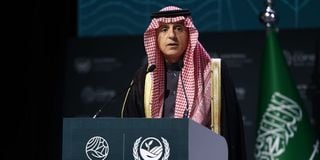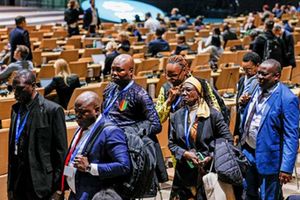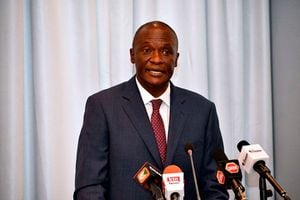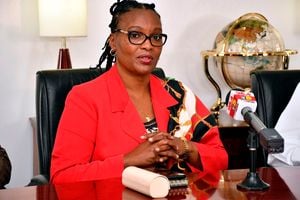Saudi Arabia to buy carbon credits from Kenya at $8 per tonne against recommended price of $80

His Excellency Adel bin Ahmed Al-Jubeir, the Minister for State, Foreign Affairs in Saudi Arabia, addresses delegates at UNCCD COP16 in Riyadh, Saudi Arabia.
What you need to know:
- The World Economic Forum wants developed countries to be fair to developing countries like Kenya.
- The World Bank recommended rate for the purchase of carbon credits by developed countries is $80 per tonne.
In Riyadh, Saudi Arabia
Saudi Arabia government officials and private sector have disclosed to Nation.Africa that the Kingdom is open to buying more carbon credits from Kenya in a voluntary carbon markets deal at $8 per tonne up from $3.
However, World Economic Forum Managing Director Gim Huey Neo is of the view that $8 per tonne is too meagre a deal.
The World Economic Forum wants developed countries to be fair to developing countries like Kenya by paying $80 for the same, which is the World Bank recommended rate that developed countries use to buy from global north countries.
This is after the two nations ‘intensified their partnership’, on a voluntary carbon markets(VCM) deal on the sidelines of the world’s biggest land conference (UNCCD COP16) currently ongoing in Riyadh, Saudi Arabia.
In March this year, at the sixth session of the United Nations Environment Assembly (UNEA-6) in Gigiri, Nairobi, Dr Osama Faqeeha, Saudi Arabia’s deputy minister for Environment, Water and Agriculture disclosed that Kenya is considered a strategic partner to Saudi Arabia and has entered into a voluntary agreement on carbon credit deals to help the former tackle land degradation issues.
The deputy minister for environment then told Nation.Africa that carbon credits can be sold to generate finance to support activities that prevent and reverse land degradation.
He added that for this to happen however, there must be a change in land use or land management that prevents land degradation and/or leads to land restoration.
In an exclusive interview with Nation.Africa on the sidelines of COP16, HE Adel bin Ahmed Al-Jubeir, the Minister for State, Foreign Affairs in Saudi Arabia, who is also the Kingdom’s Envoy for Climate Affairs, said the Kingdom of Saudi Arabia is willing to enhance financing for environment and climate issues, carbon credits and investment.
“With regards to what happened at COP29 in Baku two weeks ago as developing countries sought the $1.3 trillion per year climate finance goal, only for the COP29 Presidency to gavel a new collective quantified goal (NCQG) ‘at least $ 300 billion for low developing countries(LDCs) and at least $ 39 billion for small island developing states(SIDS), the Kingdom of Saudi Arabia is of the view that there is a responsibility by Industrialized countries to undo the pollution they have created for the last 120 years since the industrial revolution.”
The climate envoy said the $100 billion owed to developing countries as per the Paris Agreement hasn’t been fulfilled for many years.
“We believe that a lot more should be allocated to Africa and developing Nations as well as small island states from the developed world in order to deal with the climate crisis because we are all in this together and you cannot isolate yourself with what happens in the world.
"Helping countries like Kenya deal with challenges of climate change, land degradation and biodiversity is to the benefit of all of us and we have been on the forefront of countries who have provided development assistance to the world for the last 50 years,” he observed while pointing out that Saudi Arabia is one of the countries that has obliterated UN goals for developmental assistance to other countries and will continue being a brother’s keeper.
“We will continue to do so because we are part of this world and if one part suffers the rest of us suffer, if one part of this world prospers, the rest of us do the same.”
In October this year, Saudi Arabia’s Public Investment Fund (“PIF” or the “Fund”) announced the successful auction of 1.4 million tons of carbon credits, in the largest-ever carbon credit sale that was held on the first day of the 6th Edition of the Future Investment Initiative (“FII”) in Riyad.
The successful bidders included Abdul Latif Jameel, ACWA POWER Company, ENOWA (a subsidiary of NEOM), GOLF SAUDI, Gulf International Bank, International Islamic Trade Finance Corporation, Saudi Basic Industries Corporation (SABIC), Saudi Motorsport Company (SMC), Saudi National Bank, SAUDIA, Yanbu Cement Company and Zamil Group Holding Compa according to the Kingdom of Saudi Arabia.

World Economic Forum Managing Director Gim Huey Neo (left) during panel discussion at the ongoing UNCCD COP16 in Riyadh, Saudi Arabia.
“The auction offered high-quality CORSIA-compliant and Verra-registered carbon credits to support businesses operating in a diverse range of industries in the region as they play their part in the global transition to net zero, ensuring that carbon credit purchases go above and beyond meaningful emission reductions in value chains. The auction will play an important role in PIF’s wider efforts to drive investment and innovation required to address the impact of climate change and support Saudi Arabia’s efforts to achieve net zero by 2060,” an official statement explained.
The statement further clarified that the voluntary carbon markets initiative is a continuation of PIF’s efforts to support Saudi Arabia’s green agenda and follows previous announcements by the Fund, including the completion of its $ 3 billion inaugural green bond, and the various renewable projects PIF is spearheading as part of its commitment to develop 70 per cent of Saudi Arabia’s renewable energy capacity, in line with Vision 2030.
However, in an interview with Nation.Africa, Gim Huey Neo, the managing director at World Economic Forum explained that the voluntary carbon markets space remains very nascent and that the current price $3 per tonne of carbon for carbon credits from Africa and the rest of the developing world when the global north is trading at $80-$100 per tonne of the same is unfairly too.
The managing director pointed out that carbon credits from Africa are not of a much lesser quality than those from Europe and the rest of global north countries.
“There are corporates that are looking at how they can invest in carbon markets as a way to complement their climate and sustainability strategies and I think that intention is a good one but then we have to look at where these carbon credits are going to come from and how.
"There are best practices that international bodies are looking at to ensure that carbon credits are additional, permanent and of benefit to local communities, “she said while pointing out that it is not just about carbon.
“It is about biodiversity and other benefits carbon credits can bring to the local ecosystem but then again, what is the right price for each tonne of carbon?
"The World Bank indicated that carbon prices need to be at $80 per tonne for us to be able to comply with the net-zero transition pathway,” she highlighted adding that carbon projects need to be at large scale and meaningful to the community and also developers.
“We need the developers, the suppliers, buyers, communities and standard setters to continue to dialogue each other to improve what is in place so as to develop a market mechanism that generates finance to support activities such as land restoration as well as contribute meaningfully to the climate objectives of the net-zero outcome over the next decade.
While agreeing, HE Adel bin Ahmed Al-Jubeir said that investing in restoring land is extremely profitable.
“If you invest one $1 you should expect to see a return of $7 to $8 and it is beneficial from a social, food security environmental and political stability perspective. I believe that the opportunities are there and most people from the private sector will avail themselves for these opportunities,” he said while adding that if people don’t seize these opportunities it’s to their detrimental.
“I can show you studies, and proof of people already reaping massive benefits from these opportunities, what do they say?
The proof of the pudding is in the eating.”
The Saudi climate envoy further told Nation that they are very keen on making sure that UNCCD COP16 deals with the drought, desertification and land degradation issues in a practical, scientific, non-political and non-emotional manner.
The objective, he said, is to highlight the importance of dealing with desertification not only to food security but the importance of it to political stability because land degradation leads to less food production which leads to migration and conflict.
“Land degradation also has an impact on carbon capture because if land is degraded you capture less carbon which in turn impacts climate and oceans and this impacts the whole world not just Arid countries,” he told Nation.Africa.
“This is why we are working with the international community to move forward in a scientific, rational and cooperative manner.
We are keeping the finger-pointing, politics and hypocrisies out of it because this is an issue that is too important to become a political football and we are confident that we can and we will because we have the technology, resources and the political will to keep moving the world in this direction,” HE Adel bin Ahmed Al-Jubeir assured.
“We believe all of the three Conference of Parties (COPs) namely the UNFCCC COP, the Biodiversity COP and the UNCCD COP are interrelated which is why we need to tackle all of them in unison and harmony in order to deal with the environmental challenges that the world faces."





